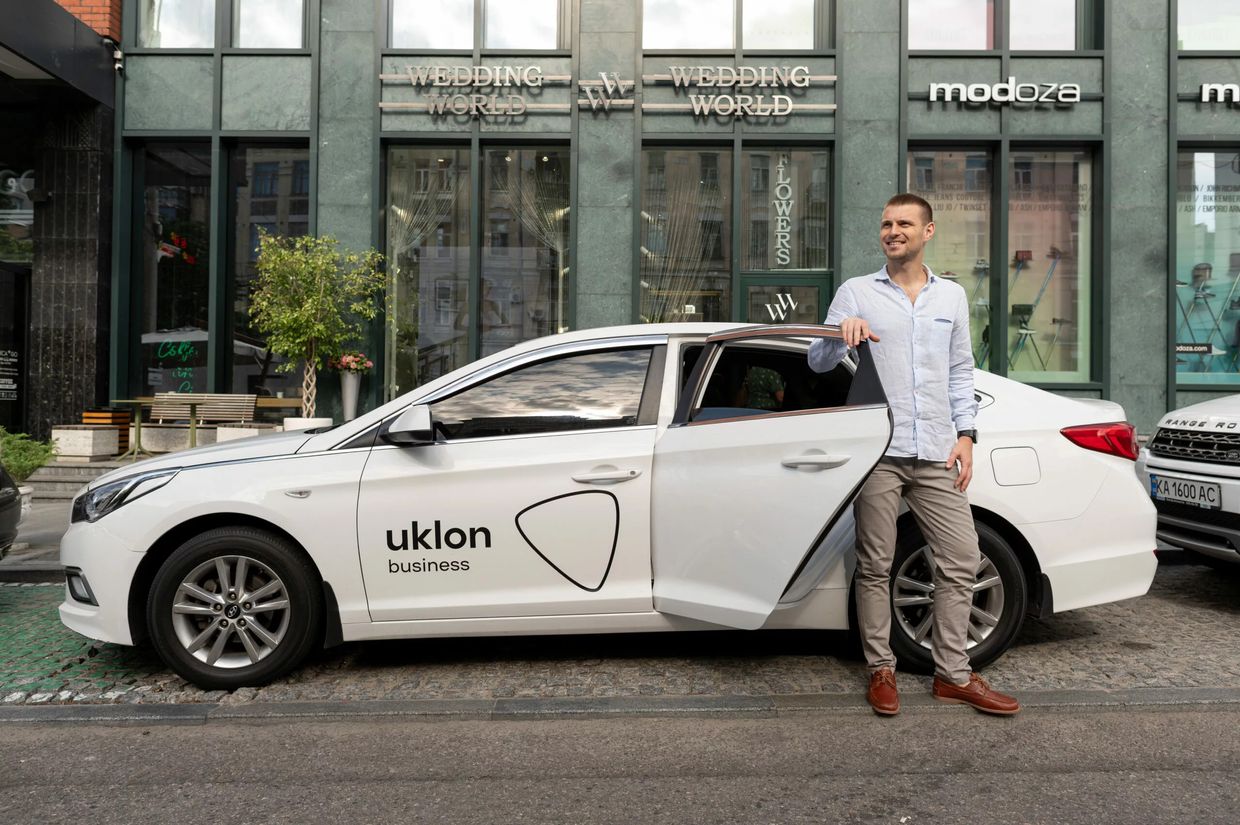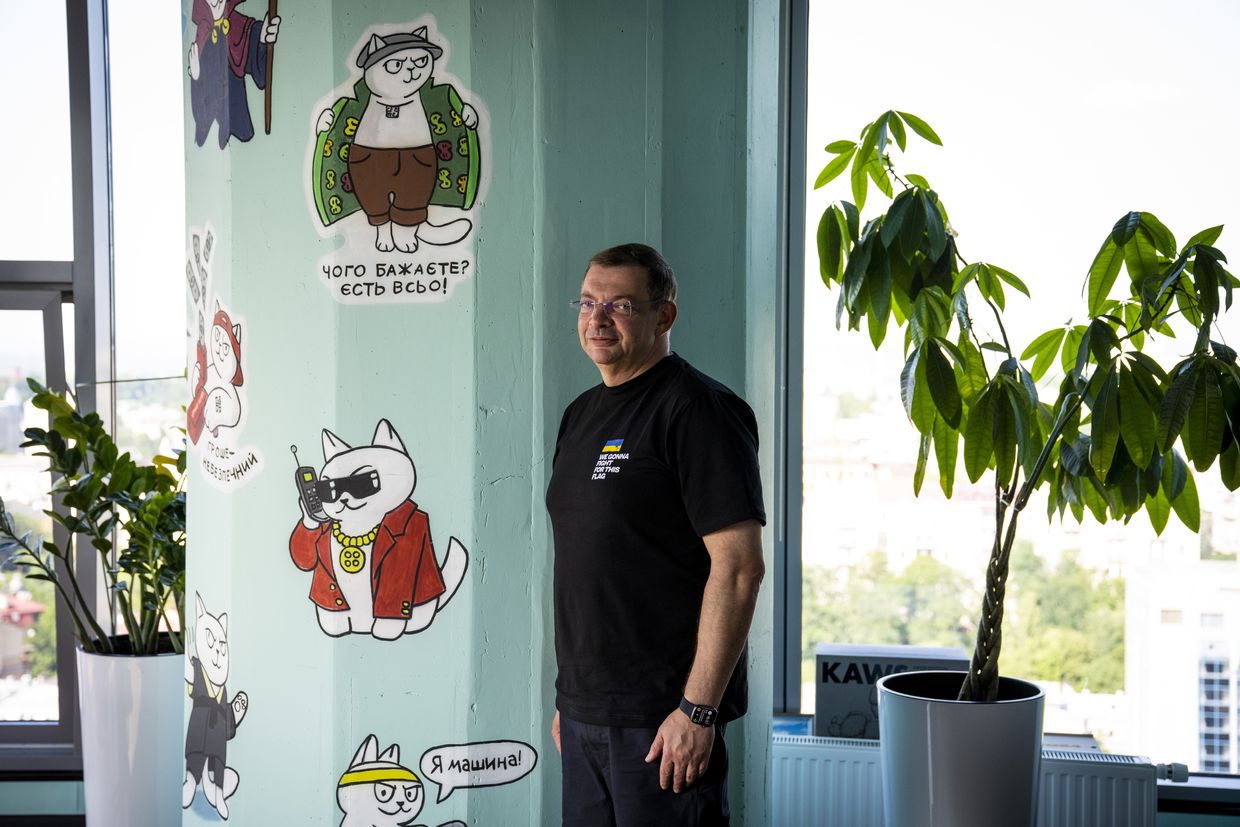‘A bumpy ride:’ CEO of MacPaw, developer of apps for Apple devices, on business during war

In an undated photo, the Macintosh models exhibited at the MacPaw's Ukrainian Apple Museum in Kyiv, Ukraine. The collection includes more than 70 original Macintosh models dating from 1981 to 2017. (Courtesy of MacPaw)
Russia’s full-scale war on Ukraine has dealt a devastating blow to the country’s economy. While the country has begun to bounce back from an initial 29% drop in GDP, it’s estimated that at today’s level of growth, the country’s GDP won’t return to pre-war levels at least until 2030.
Some areas of the economy, however, have proved more resilient than others, and – remarkably – some companies are even finding opportunities amid the disaster of war.
That’s according to Oleksandr Kosovan, the founder and CEO of MacPaw, a software development company headquartered in Kyiv that develops and distributes software for Apple’s macOS and iOS operating systems.
“The war has led to an increase in cybersecurity startups and investment opportunities in this area,” Kosovan told the Kyiv Independent in a recent interview.

“The IT industry (as a whole) remains Ukraine's only fully operational export branch, despite the war, even increasing export volumes and its contribution to GDP.”
In fact, in 2023 IT services totaled $8 billion, accounting for 41.5% of Ukraine's total exports and 4.9% of its GDP, as per a recent Lviv IT Cluster report. There's also been a rise in IT specialists' salaries, which also indicates the sector's resilience.
This resilience in turn means the Ukrainian IT market has retained its appeal to global investors. Moreover, Ukrainian developers were already well known worldwide for their skills and strong work ethics, making Ukraine a promising hub for software development even in wartime.
Stable development
MacPaw, founded in 2008 and the maker of CleanMyMac X, Setapp, ClearVPN, and other popular apps for Mac computers and devices, is perhaps emblematic of the sector as a whole.
In 2022, the first year of the full-scale war, its staff actually increased by 22%, and last year saw its personnel grow a further 14%, bringing its total workforce to over 540. It’s also branching out to new areas – in July 2023, MacPaw marked its 15th anniversary with the launch of Moonlock, a cybersecurity division focused on Mac user safety and enhancing security features.
Since 2008, MacPaw has launched more than ten products, and every fifth Mac on the planet has at least one MacPaw app, Kosovan says. He is also a co-founder of the SMRK Venture Capital Fund, which provides venture investment for Ukrainian IT startups. SMRK has invested in companies like AJAX, Preply, Esper Bionics, and Deus Robotics.
“MacPaw experienced growth in certain areas while maintaining stability in others,” Kosovan says.
MacPaw’s software has been downloaded in over 180 countries, with the United States representing 41% of the company’s user base, closely followed by Europe at 40%. The remaining 19% are users from various other countries, showcasing the global appeal of MacPaw products.
The company took a step to strengthen its international presence still more in September 2023, when it opened an office in Boston to connect it with its key markets. However, Kosovan says that MacPaw's achievements extended beyond product development.
“The MacPaw Foundation, supported by users worldwide and Ukrainian backers, has played a significant role by contributing over $9 million in aid to Ukrainians,” he says. “These contributions reflected the resilience and adaptability of Ukrainians, maintaining effective global services and aiding the recovery of their home country.”
MacPaw has also allocated $1 million to the Promprylad.Renovation innovation center in Ivano-Frankivsk, in western Ukraine. This initiative aimed to support local businesses, encouraging their sustained contribution to Ukraine's economy during and after the war. MacPaw’s contribution brought the total investment in the project up to $1.5 million.
Resilient team
Still, Russia’s full-scale war on Ukraine has brought challenges and changes to Kosovan and his team.
“The last couple of years have been the most challenging period for both MacPaw and myself, Kosovan says. “I had to make decisions with life-altering consequences.”
The MacPaw team underwent significant changes, with many specialists relocating and adapting to remote work. “Around 70% of the team chose to stay in Ukraine,” Kosovan says. Men of fighting age, from 18 to 60, are not permitted to leave the country during wartime.



“But I’m nostalgic for the times when the team worked together from one peaceful office in Kyiv.”
As a company, MacPaw pivoted to meet the challenges head-on, preparing for various scenarios and developing contingency plans to ensure the Kyiv office would stay operational.
It also took strategic measures such as halting sales in Russia and Belarus, and providing free access to ClearVPN to Ukrainian users to help protect them from cyberattacks.
And despite all the disruption, MacPaw is still managing to develop new products like anti-spyware tool SpyBuster and Together App– a tool used for keeping remote-working company teams connected.
And of course, corporate social responsibility took on a new dimension, with the MacPaw Foundation redirecting funds to support those affected by the war.

In turn, Kosovan is also grateful for the support his company has received from customers and people worldwide, which he said had helped to keep the business afloat.
“It’s been a bumpy ride, marked by adaptation and resilience, to maintain pre-war performance levels,” he says.
Losses from war
Luckily, MacPaw hasn’t suffered any direct physical losses due to Russia’s war and bombing campaigns in Ukraine.
“We have been, however, significantly impacted by indirect losses stemming from disruptions to business operations, and having to divert resources to support Ukraine against the Russian invasion,” Kosovan says.
“It’s challenging to maintain productivity amidst regular air alerts, mobilization, blackouts, and the general recession in Ukraine's economy. The most significant loss came from the postponement of major product releases due to uncertainties in quality and timelines amid potential blackouts.”


“A lot of time and resources also went toward developing Business Continuity Plans to prepare for various scenarios, including the possibility of a complete loss of Internet connections in Ukraine.”
In terms of the financial impact, Kosovan estimates that MacPaw has lost approximately $50 million due to the Russian aggression.
“But the company's business model was independent of the Ukrainian market or sales in Russia or Belarus, with most of our customers coming from the U.S. and Europe. And our data and infrastructure were hosted on secure cloud providers like Amazon Web Services.”
Plans and development
As for plans for MacPaw's development in 2024, during the ongoing war, Kosovan says the company will continue with its global strategy, while adapting to new realities and global trends.
“The primary focus remains on integrating AI into products, and enhancing security and privacy solutions for customers in existing and new offerings,” he says.
MacPaw aims to grow the Boston office to at least 30 team members by 2025. The focus will be on international recruitment and supporting specialists already abroad with resident permits. Globally, the significance of cybersecurity has increased, and resultantly MacPaw's Moonlock division has been dedicated to developing user-friendly cybersecurity tools, exemplified by the Moonlock Engine technology which enhances the CleanMyMac app.
“We’ve got ambitious plans, but they’ve needed a lot of thought to navigate the complexities of the ongoing war,” Kosovan says. “The vision for 2024 and beyond is to sustain, grow, and evolve, making sure MacPaw stays at the forefront of technology while contributing positively to society.”
Kosovan also underlines MacPaw's commitment to staying in Ukraine and investing efforts in its recovery and development.
“Supporting Ukraine’s advocates and its defenders will be a core commitment until victory is achieved,” he says.
He is optimistic that Russia will be held accountable for its crimes, with the Kremlin’s international assets being redirected to rebuild Ukraine. Kosovan envisions a scenario similar to the Marshall Plan, contributing to Ukraine's economic recovery, attracting millions of Ukrainians back home, and providing an opportunity to rebuild the country with modern infrastructure.
In the meantime, Kosovan has set MacPaw the ambitious goal in 2024 of regaining its pre-war annual growth rate of 40%. Focus areas will include the new Moonlock cybersecurity products, new generation AI-infused products, and major product releases.
“The company aims to be at the forefront of industry shifts, expanding geographically by hiring internationally,” Kosovan says. “And despite the ongoing challenges, MacPaw remains committed to playing a pivotal role in shaping the industry's future.”
Business climate
Meanwhile, the current business climate in Ukraine is tough, Kosovan admits.
“The robustness and resilience of businesses has become crucial for survival, with significant hurdles – such as issues with law enforcement, corruption, the ongoing war, attacks on civil infrastructure, mobilization efforts, and economic pressure to increase taxes.”
“A lot of good work’s been done on economic reforms, anti-corruption, and business regulation, but there are still some challenges that hinder domestic and international companies from operating and thriving.”
In particular, Kosovan says there’s a need for more effective dialogue on the government's National Revenue Strategy: The country’s business associations oppose it, complaining that they were left out of the consultation loop when the strategy was drawn up.
“There’s a need for a genuine dialogue between the government and the business community, and the government needs to foster a cooperative relationship between law enforcement and businesses,” Kosovan says.
He says Ukraine’s Digital Transformation Ministry should act as a mediator between business and the government, as it is an institution that’s trusted by business.

“Businesses need to be vocal, united, and proactive,” he says. “The government needs to be more receptive to businesses’ needs, and play a supportive role in fostering growth.”
“A cooperative relationship, based on mutual respect, is going to be essential for there to be prosperous businesses and a good future after the war.”













